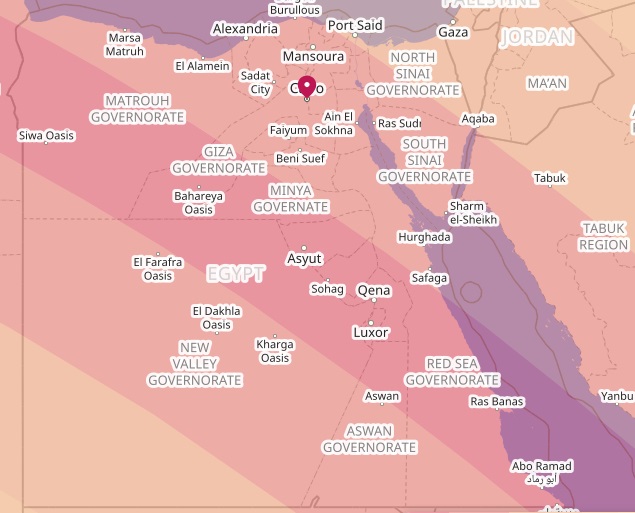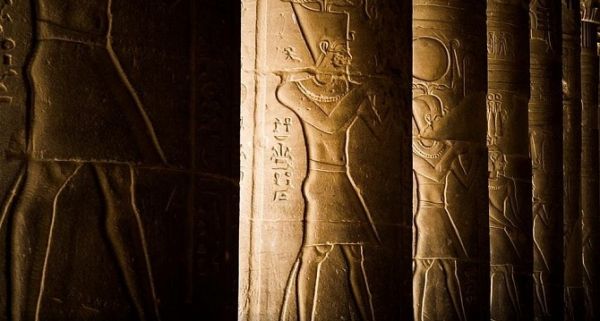Egypt's 2027 Solar Eclipse: A Journey Through History
The allure of a solar eclipse has fascinated humanity for millennia. In Egypt, a land of timeless wonders, witnessing a solar eclipse combines natural celestial beauty with the awe-inspiring backdrop of ancient history. This comprehensive guide explores everything you need to know about solar eclipses, their historical significance in Egypt, and why the 2027 Total Solar Eclipse in Egypt is an unmissable event.
What Is a Solar Eclipse?
A solar eclipse occurs when the Moon moves between the Earth and the Sun, casting a shadow on parts of the Earth. The type of eclipse depends on the alignment between these celestial bodies. The three main types are:
- Partial Solar Eclipse: The Moon covers only a portion of the Sun, creating a crescent shape.
- Annular Solar Eclipse: The Moon appears smaller than the Sun, leaving a ring of sunlight visible.
- Total Solar Eclipse: The Moon completely obscures the Sun, plunging the area in the shadow into temporary darkness and revealing the Sun's outer atmosphere, the corona.
Total solar eclipses are particularly captivating because of the dramatic environmental changes they bring: sudden darkness, a drop in temperature, and the appearance of stars in the daytime sky.
How Often Is a Solar Eclipse Visible?
While solar eclipses occur between two to five times annually worldwide, a total solar eclipse is far rarer for any given location. A specific spot on Earth might experience a total solar eclipse only once every 375 years.
This rarity makes events like the 2027 Total Solar Eclipse in Egypt exceptionally special. Planning ahead allows travelers to witness a phenomenon that combines the wonders of astronomy with the rich historical and cultural backdrop of Egypt.
Partial vs. Total Solar Eclipse
The distinction between partial and total solar eclipses significantly impacts the viewing experience:
- Partial Solar Eclipse: A fascinating event where the Moon partially covers the Sun, but the sky remains mostly bright.
- Total Solar Eclipse: The Moon’s shadow, or umbra, completely covers the Sun, creating a surreal and transformative experience. Birds may stop chirping, stars may appear, and an eerie twilight envelops the landscape.
The 2027 Total Solar Eclipse in Egypt offers travelers the opportunity to experience the full drama of totality in one of the world's most historically significant destinations.
Equipment Needed to View a Solar Eclipse
Proper preparation enhances the safety and enjoyment of viewing a solar eclipse. Here’s what you’ll need:
- Eclipse Glasses: Certified glasses to protect your eyes from harmful UV rays. Never look directly at the Sun without proper protection, except during totality.
- Solar Filters for Cameras and Telescopes: Essential for capturing detailed images safely.
- Binoculars with Solar Filters: For close-up views of the eclipse.
- Tripod and DSLR Camera: Ensure stability and high-quality photography during the event.
- Comfort Items: Bring chairs, water, and sunblock for extended viewing sessions.
During totality, viewers can safely remove their glasses and look directly at the eclipse, but only for the brief duration of the Moon's complete coverage.
A Glimpse into the History of Solar Eclipses in Egypt
Egypt has a long history of celestial observation, with solar eclipses playing a significant role in its cultural and spiritual life. Ancient Egyptians meticulously recorded astronomical events, reflecting their advanced understanding of the cosmos.
Solar Eclipses in Ancient Egyptian Mythology
The ancient Egyptians often interpreted solar eclipses through the lens of mythology. The Sun god Ra, a central figure in their pantheon, symbolized light, life, and order. A solar eclipse was thought to represent Ra's battle with the serpent Apep, a force of chaos and darkness. Priests performed elaborate rituals to ensure Ra's victory and the restoration of cosmic balance.
This blend of science and spirituality highlights the profound connection between celestial events and Egyptian culture.
The 2027 Total Solar Eclipse in Egypt
On August 2, 2027, Egypt will host one of the most anticipated celestial events of the decade: a Total Solar Eclipse. The Moon’s shadow will traverse North Africa, with Egypt providing some of the best vantage points for observing this spectacular phenomenon.
Path of the 2027 Total Solar Eclipse in Egypt

The eclipse path will move southeast across Egypt, with notable locations along the path of totality:
- Siwa Oasis: A tranquil desert retreat known for its palm groves and salt lakes, offering a peaceful setting for eclipse viewing.
- Luxor: The “world’s greatest open-air museum” will serve as a stunning historical backdrop during the eclipse.
- Aswan: Situated along the Nile River, Aswan combines natural beauty with cultural heritage, making it an ideal viewing spot.
The duration of totality in Egypt will reach up to 6 minutes and 22 seconds, making it one of the longest eclipse durations in recent history.
Egypt Total Eclipse Tours and Itineraries
To fully experience the 2027 solar eclipse, we offer specialized packages that combine celestial observation with Egypt’s rich cultural and historical offerings. Simply fill out the attached booking form with your contact information, preferred itinerary, or any special requests, and our expert tour consultants will assist you in planning a dream-like eclipse tour in Egypt. Don’t miss this once-in-a-lifetime opportunity to witness the eclipse in one of the most iconic destinations on Earth!
Popular Eclipse Tour Features
- Eclipse Viewing Events: Guided sessions with astronomers providing insights into the phenomenon.
- Historical Site Visits: Tours of iconic landmarks, such as the Pyramids of Giza, Valley of the Kings, and Abu Simbel.
- Nile Cruises: A luxurious way to explore Egypt while preparing for the eclipse event.
- Desert Excursions: Stargazing and camel treks in the serene deserts of Egypt.
- Local Cuisine and Culture: Immersive experiences that include traditional Egyptian meals and performances.
Sample Itinerary for the 2027 Total Solar Eclipse
Day 1: Arrive in Cairo, explore the Pyramids of Giza, and enjoy a welcome dinner.
Day 2: Visit the Egyptian Museum and take a flight to Luxor.
Day 3: Explore Karnak and Luxor Temples.
Day 4: Witness the solar eclipse in a prime location in Luxor, followed by celebrations.
Day 5: Travel to Aswan, visit Philae Temple, and enjoy a felucca ride on the Nile.
Day 6: Explore Abu Simbel and relax by the Nile.
Day 7: Depart from Aswan or return to Cairo for your onward journey.
Tips for Planning Your Eclipse Trip to Egypt
To make the most of your journey, consider these tips:
- Book in Advance: Eclipse tours and accommodations fill up quickly, especially in popular locations.
- Pack Appropriately: Egypt in August can be hot. Lightweight clothing, sunscreen, and plenty of water are essential.
- Understand the Culture: Familiarize yourself with local customs and traditions to enhance your experience.
- Choose a Reputable Tour Operator: Ensure your trip is organized by professionals.
Why Egypt Is the Perfect Destination for a Solar Eclipse
Few places on Earth offer the unique blend of natural beauty, historical significance, and cultural richness that Egypt provides. From the ancient myths surrounding solar eclipses to the modern convenience of specialized tours, Egypt is a premier destination for witnessing this celestial event.
The 2027 Total Solar Eclipse in Egypt promises not only an unforgettable astronomical experience but also the chance to immerse yourself in the timeless wonders of this ancient land.
The 2027 Total Solar Eclipse in Egypt is more than just a natural event—it’s a once-in-a-lifetime opportunity to witness the marvels of the universe against the backdrop of one of the most historically and culturally rich nations on Earth.
From the scientific intrigue of solar eclipses to the spiritual resonance they hold in Egyptian history, this celestial phenomenon is sure to leave a lasting impression. Whether you’re exploring ancient temples, cruising the Nile, or simply gazing at the sky, Egypt during the eclipse is an experience you’ll cherish forever.
Start planning now to secure your place under the shadow of the Moon in Egypt, where the mysteries of the cosmos meet the grandeur of human history.
Tips for Planning Solar Eclipse in Egypt 2027
- Begin planning your unforgettable celestial experience by submitting the booking form available on this page.
- You'll receive a customized travel proposal from our expert consultants, tailored to your interests.
- Any adjustments are welcome to ensure the best-fit offer for your needs.
- Witness the rare solar eclipse while exploring Egypt’s timeless wonders. Combine this once-in-a-lifetime event with visits to iconic landmarks like the Pyramids of Giza and ancient temples along the Nile.
- Tours are guided by certified Egyptologists and include accommodations, transfers, and immersive activities.
- We accommodate solo travelers, couples, families, and groups, with flexible budget and luxury options for single, double, and triple occupancy.
- Pricing follows our transparent policy and includes taxes, entrance fees, and most meals.
- Seasonal events and eclipse-specific schedules may affect rates—please inquire for updated availability.
- Book now to reserve your place for this extraordinary astronomical journey.
- Join our subscriber list to receive exclusive updates, deals, and special travel opportunities across the USA, UK, Canada, Australia, India, and more.
Top-rated Egypt Eclipse Tours 2027
| Tour | Itinerary | Price |
|---|---|---|
| Egypt Solar Eclipse Tour Package | 9 Days | $ 6895 |
Frequently Asked Questions
Are solar eclipses dangerous?
Solar eclipses are not inherently dangerous, but viewing them without proper eye protection can cause severe damage to your eyesight. Always use certified eclipse glasses or solar filters when observing the Sun, except during the brief moments of totality when it is safe to look directly at the eclipse.
Why are solar eclipses rare?
Solar eclipses are rare because they require precise alignment of the Earth, Moon, and Sun. The Moon's shadow covers only a small portion of the Earth's surface, making the path of totality limited to specific regions. Additionally, the timing of the Moon's orbit and the Earth's tilt adds to the rarity of these events.
When is the next solar eclipse in Egypt?
The next solar eclipse in Egypt will occur on August 2, 2027, and it will be a total solar eclipse visible across various regions of the country.
When was the last solar eclipse in Egypt?
The last solar eclipse visible in Egypt was a partial solar eclipse on October 25, 2022.
How long will the solar eclipse last in Egypt?
The total solar eclipse in Egypt on August 2, 2027, will last up to 6 minutes and 22 seconds, depending on the viewing location.
What did ancient Egypt think about the solar eclipse?
In ancient Egyptian mythology, a solar eclipse symbolized the struggle between the Sun god Ra and the chaotic serpent Apep. Rituals were conducted to protect Ra and ensure the return of light and order to the world.
When was the last full solar eclipse in Egypt?
The last full (total) solar eclipse visible in Egypt occurred on March 29, 2006, with many regions experiencing totality.

